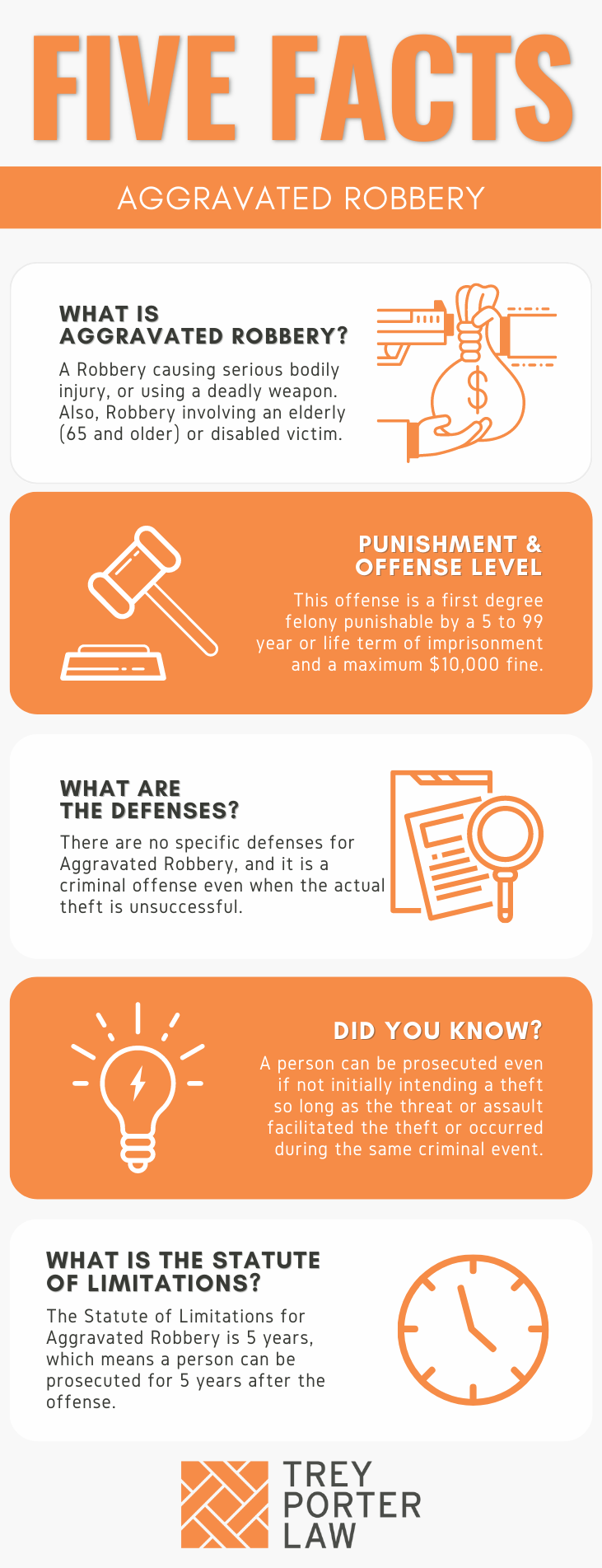WHAT IS AGGRAVATED ROBBERY IN TEXAS?
The Texas offense of aggravated robbery occurs when a person, in the course of committing theft:
- causes serious bodily injury to another;
- uses or exhibits a deadly weapon;
- causes bodily injury to an elderly person at least 65 years of age or a disabled person; or
- threatens or places an elderly person at least 65 years of age or a disabled person in fear of imminent bodily injury or death.

- What is the difference between robbery and aggravated robbery? Robbery, as defined by Texas Penal Code 29.02, becomes aggravated robbery when a person uses a deadly weapon, or causes serious bodily injury to another while committing robbery. If a person commits robbery and causes bodily injury or threatens or places another in fear of imminent bodily injury or death, it is enhanced to aggravated robbery if the victim is 65 years of age or older, or disabled.
WHAT IS THE AGGRAVATED ROBBERY LAW IN TEXAS?
Tex. Penal Code § 29.03. AGGRAVATED ROBBERY.
(a) A person commits an offense if he commits robbery as defined in Section 29.02, and he:
(1) causes serious bodily injury to another;
(2) uses or exhibits a deadly weapon; or
(3) causes bodily injury to another person or threatens or places another person in fear of imminent bodily injury or death, if the other person is:
(A) 65 years of age or older; or
(B) a disabled person.
(b) An offense under this section is a felony of the first degree.
WHAT IS THE PENALTY CLASS FOR AGGRAVATED ROBBERY IN TEXAS?
Aggravated robbery is classified as a first degree felony, punishable by five to 99 years or life in prison.
WHAT IS THE PUNISHMENT RANGE FOR AGGRAVATED ROBBERY IN TEXAS?
The punishment range for aggravated robbery is between five and 99 years or life in prison, and a maximum fine of $10,000.
WHAT ARE THE PENALTIES FOR AGGRAVATED ROBBERY IN TEXAS?
A person charged with aggravated robbery may be placed on deferred adjudication, which is not a conviction, for a period of up to ten years after a plea of guilty or nolo contendere (“no contest”) to a judge.
Pursuant to Texas Code of Criminal Procedure article 42A.054, a person convicted of aggravated robbery is not eligible for probation from a judge. However, a jury may recommend probation after a guilty finding if the jury assesses a prison sentence of ten years or less, makes no affirmative finding of a deadly weapon, and the person has no prior felony convictions.
WHAT ARE THE DEFENSES TO AGGRAVATED ROBBERY IN TEXAS?
The justification defenses are available in aggravated robbery cases, but one must always admit to committing the crime in order to argue he or she was justified in doing so.
- Can a person be charged with aggravated robbery if the person did not actually steal anything, or complete the theft? Texas law does not require a successful theft a prerequisite to the commission of robbery or aggravated robbery. The “gravamen,” or crux, of aggravated robbery is the assaultive conduct, not theft. The value of any stolen property is likewise immaterial.
WHAT IS THE STATUTE OF LIMITATIONS FOR AGGRAVATED ROBBERY IN TEXAS?
The limitation period for aggravated robbery, a first degree felony, is five years.
AGGRAVATED ROBBERY IN TEXAS
Causing serious bodily injury, the presence of a deadly weapon, or the status of the victim or victims as elderly or disabled is what distinguishes aggravated robbery from robbery and theft. If a person uses or exhibits a deadly weapon during or in immediate flight from the robbery, regardless of whether the victim sees it, the person may be convicted of aggravated robbery.
TEXAS AGGRAVATED ROBBERY COURT CASES
The case law regarding aggravated robbery in Texas shows that it is not necessary for the victim to actually perceive a threat for a person to be convicted of robbery-by-threats.
- In In re A.J.R.P., a juvenile victim walking home noticed the defendant, another juvenile he knew from school, following him. Moments later, the victim was hit in the back of the head, and blacked out. When he woke up, his phone was gone, and there was a landscaping stone next to him.The defendant was found with the victim’s phone a few days later, and a jury convicted him of robbery by threatening the victim with bodily injury. The appellate court distinguished robbery-by-placing-in-fear and robbery-by-threats, and held it was not necessary for the victim to perceive the threat.
- In Boston v. State, the defendant reached over the counter and took money from the cash register. He had a gun, but the store clerk did not see it. The Court of Criminal Appeals held it is not necessary for the deadly weapon to be used in the threat itself. The Court agreed the clerk had been threatened or placed in fear, despite not seeing the firearm. And regardless of whether the clerk saw it, the defendant’s possession of the firearm during the robbery supports his aggravated robbery conviction.
















